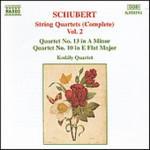
Complete String Quartets Vol 2 (Nos 10 & 13)
 $25.00
Out of Stock
$25.00
Out of Stock6+ weeks add to cart
SCHUBERT
Complete String Quartets Vol 2 (Nos 10 & 13)
Kodaly Quartet
[ Naxos / CD ]
Release Date: Saturday 2 July 2005
This item is currently out of stock. It may take 6 or more weeks to obtain from when you place your order as this is a specialist product.
"The Kodaly's fine reading"
(Classic CD)
Franz Schubert was born in 1797, the son of a Vienna schoolmaster, and had his education as a chorister of the Imperial Chapel at the Stadtkonvikt. Both at school and at home he had an active musical life as a player and as a composer, and when his voice broke and he was offered the means to continue his academic education, he decided, instead, to train as a teacher, thus being able to devote more time to music. By the age of eighteen he had joined his father in the schoolroom, while continuing to compose and to study with the old Court Kapellmeister Antonio Salieri. In 1816 he moved away from home, lodging with his new friend, Franz von Schober, thus released for the moment from the drudgery of teaching. The following years found him generally in the company of friends, with an occasional return to the schoolroom, when necessity dictated, showing there no great talent or interest in his task.
Schubert's brief career continued in Vienna and while there were occasional commissions and some of his works were published, there was never the opportunity for the kind of distinguished patronage that Beethoven had had and still enjoyed, nor the possibility of an official position in the musical establishment of the city. It was February 1828 before Schubert was able to take the risk of a concert devoted to his work, an event that proved both successful and profitable, but by the autumn his health had weakened, the consequence of a venereal infection contracted six years earlier. He died on 19th November.
As a composer Schubert was both precocious and prolific. Over the years he wrote some five hundred songs and a quantity of piano and chamber music, including fifteen string quartets, with larger scale works for the theatre and for orchestra, although he never had a professional orchestra regularly available to him, as Haydn had had by the nature of his employment as a princely Kapellmeister, or as Beethoven had through the good offices of his rich patrons. He was able to hear his orchestral compositions in performances by an ensemble that had developed over the years from the Schubert family string quartet, while chamber music on occasions received professional attention, notably from Schuppanzigh and his colleagues. Schubert himself was both pianist and string-player and as a boy had played the viola in the family quartet, where his father played the cello and his older brothers the violin. The language of the classical string quartet had long been familiar to him.
The present release includes the last of Schubert's quartets and five Deutsche. The Quartet in G major, Op. 161, was written during the last ten days of June in 1826 and published posthumously in 1851. 1826 had brought Schubert some success, arrangements with publishers and a favourable review of his Piano Sonata in A minor, Op. 42, in the Leipzig Allgemeine musikalische Zeitung on 1st March. The death of Salieri in 1825 and that of the court organist Vori‰ek had made changes in the Court Chapel possible. Schubert had shown no interest in the position of court organist, but on 7th April he submitted an application for the more ambitious position of Vice-Hofkapellmeister. In his application he set down his qualifications for the post, supporting his petition with a recommendation from his teacher Salieri, given him in 1819. In the event he was short-listed, but early in the following year the place went to Josef Weigl, for the moment to receive no salary additional to that he already received as conductor of the Court Theatre.
Tracks:
String Quartet No. 13 in A minor, D. 804
String Quartet No. 10 in E flat major, D. 87



